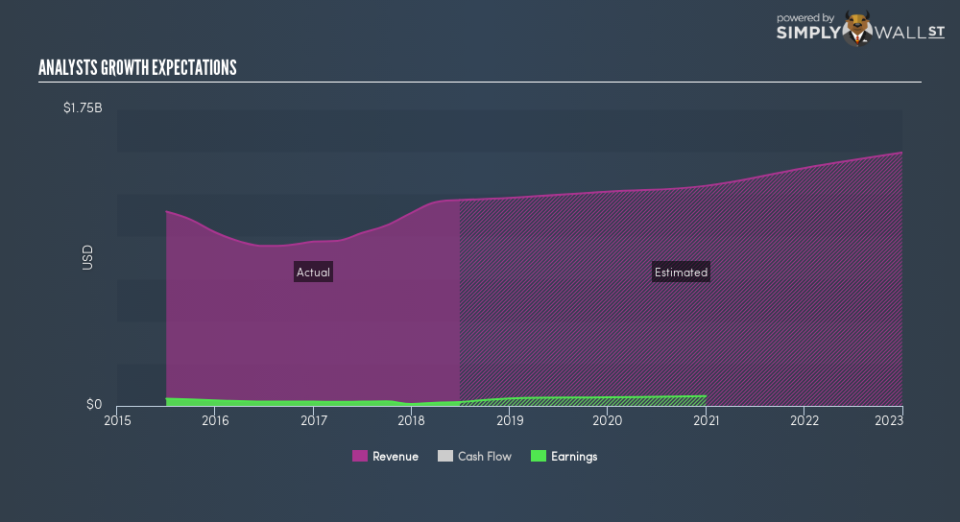Materion Corporation’s (NYSE:MTRN) Insiders Have Sold Shares – Should You?

Materion Corporation manufactures and sells advanced engineered materials used in consumer electronics, industrial components, defense, medical, automotive electronics, telecommunications infrastructure, energy, commercial aerospace, science, services, and appliance markets worldwide. Materion is one of United States’s large-cap stocks that saw some insider selling over the past three months, with insiders divesting from 7.60k shares during this period. Generally, insiders selling shares in their own firm sends a bearish signal. A two-decade research published in The MIT Press (1998) showed that stocks following insider selling declined 2.7% relative to the market. However, these signals may not be enough to gain conviction on whether to divest. Today we will evaluate whether these decisions are bolstered by analysts’ expectations of future growth as well as recent share price movements.
Check out our latest analysis for Materion
Which Insiders Are Selling?
There were more Materion insiders that have sold shares than those that have bought. In total, individual insiders own less than one million shares in the business, or around 0.70% of total shares outstanding.
Insiders that have recently sold some of their shares include Gregory Chemnitz (management) and Joseph Kelley (management) .
Does Selling Activity Reflect Future Growth?
Analysts’ expectations for earnings over the next 3 years of 147% provides a very optimistic outlook for the business. However, this is inconsistent with the signal company insiders are sending with their net selling activity.
Probing further into annual growth rates, analysts anticipate a rather subdued top-line growth over the next year, but a suggestively greater level of expected earnings growth. Generally, this difference can be explained by a large drop in cost growth.
However, insiders may recognise this is not a sustainable practice and this negative sentiment is evidenced by their net selling activity. Or they may simply view the current share price is well-above the intrinsic value, providing a prime time to sell.
Did Insiders Sell On Share Price Volatility?
Alternatively, the timing of these insider transactions may have been driven by share price volatility. This means, if insiders believe shares were heavily undervalued recently, this would provide a prime opportunity to buy more irrespective of its growth outlook.
Materion’s shares ranged between $64.45 and $53.7 over the past three months. This suggests reasonable volatility with a change of 20.02%.
Insiders’ purchases may not be driven by this movement but perhaps they may simply want to diversify their holdings, distribute stock to investors, or simply require the cash for personal reasons.
Next Steps:
Materion’s net selling activity tells us the stock has fallen out of favour with some insiders as of late, though the positive growth in expected earnings tells us a different story, and the relatively stable stock price may not warrant exploiting any mispricing. However, it’s important to keep in mind, insider selling may not necessarily be based on their belief of the company’s ability to perform in the future. Moreover, while insider selling can be a useful prompt, following the lead of an insider, however, will never replace diligent research. there are two important factors you should further examine:
Financial Health: Does Materion have a healthy balance sheet? Take a look at our free balance sheet analysis with six simple checks on key factors like leverage and risk.
Other High Quality Alternatives : Are there other high quality stocks you could be holding instead of Materion? Explore our interactive list of high quality stocks to get an idea of what else is out there you may be missing!
NB: Figures in this article are calculated using data from the last twelve months, which refer to the 12-month period ending on the last date of the month the financial statement is dated. This may not be consistent with full year annual report figures.
To help readers see past the short term volatility of the financial market, we aim to bring you a long-term focused research analysis purely driven by fundamental data. Note that our analysis does not factor in the latest price-sensitive company announcements.
The author is an independent contributor and at the time of publication had no position in the stocks mentioned. For errors that warrant correction please contact the editor at editorial-team@simplywallst.com.


